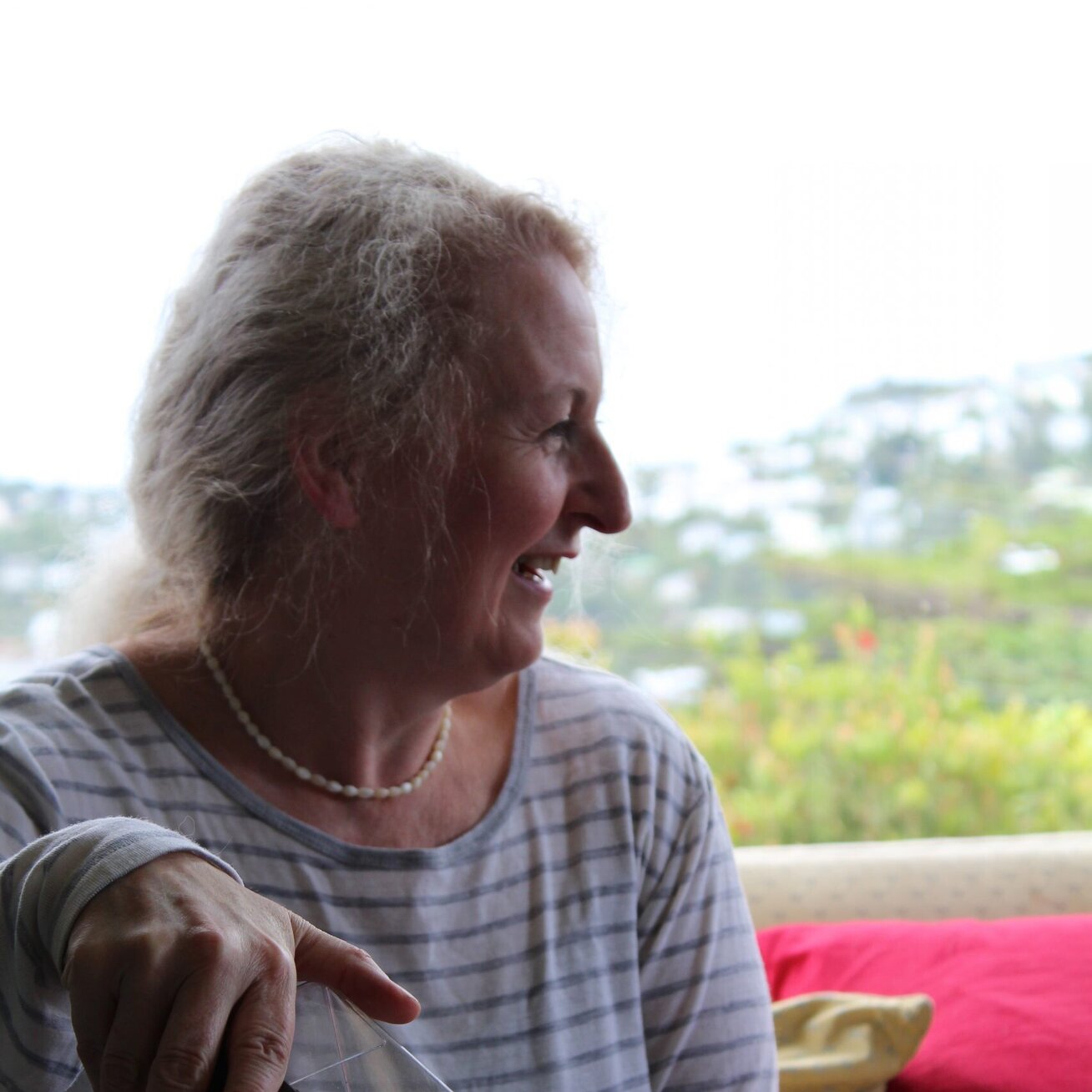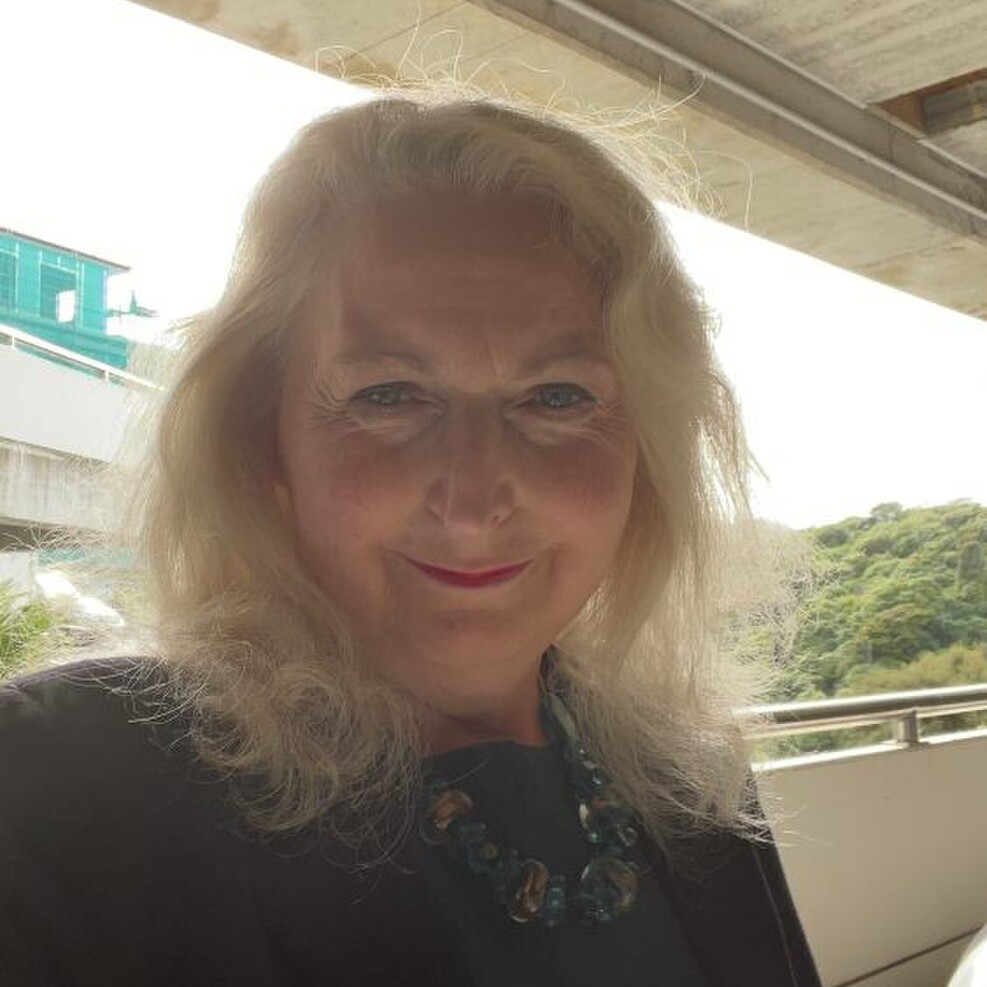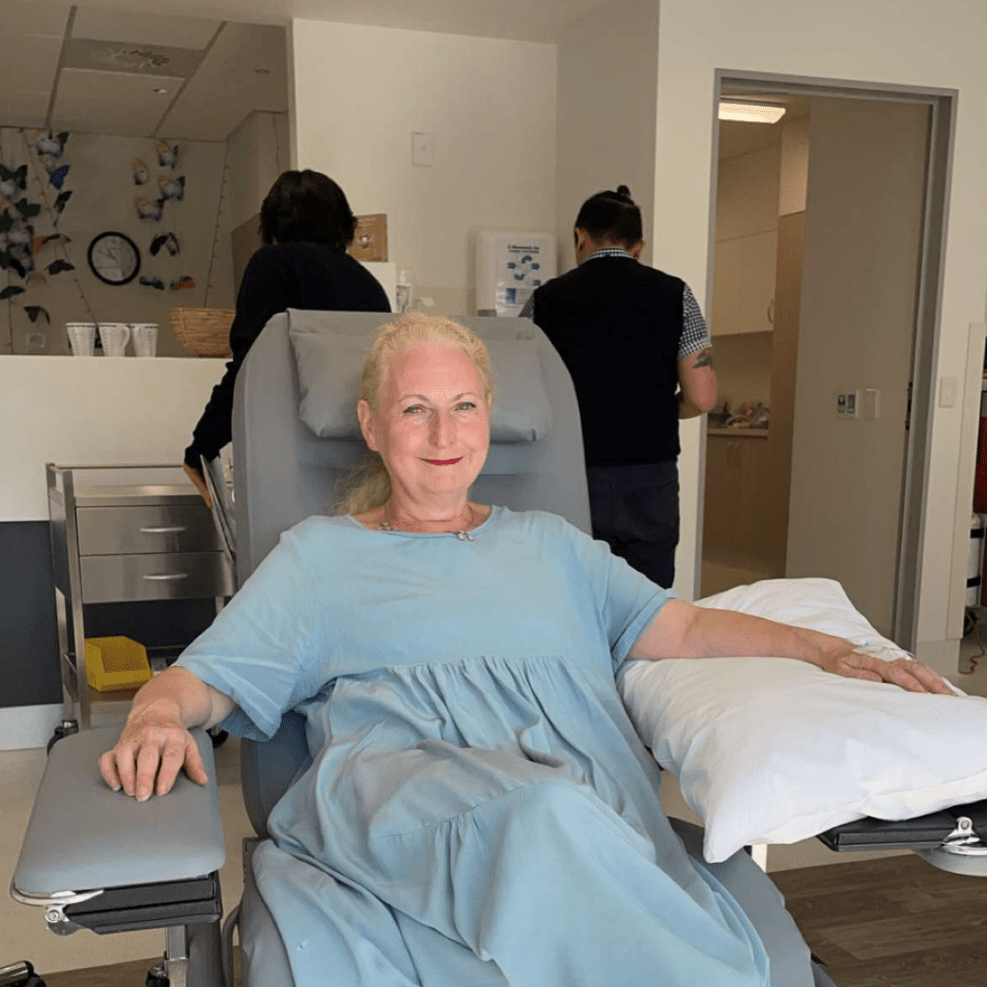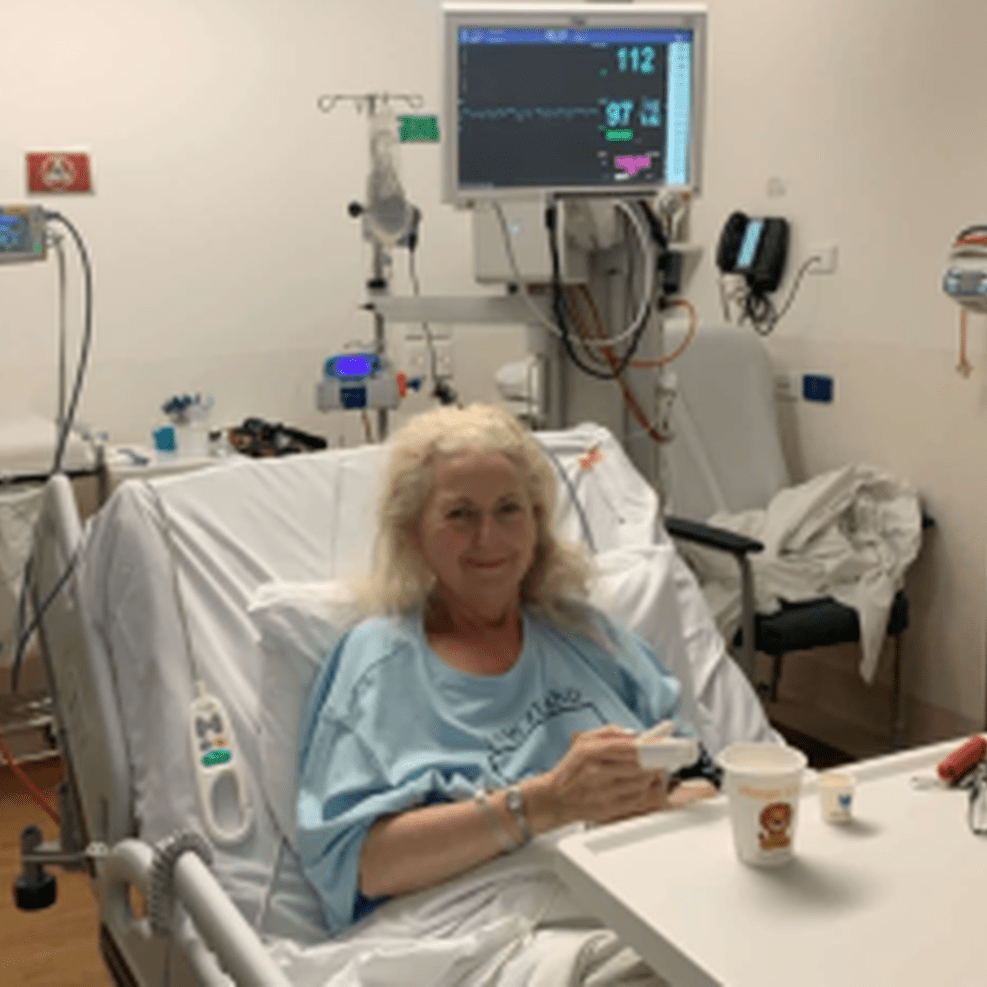Hilary’s Oesophageal Cancer Story
I’m a fairly (but far from super) fit woman, I work in school administration, have three lovely 26-year-old children, Emily, Tom and Leandra, a very long-suffering husband Toby with whom I’d always planned to grow old disgracefully; I love tramping, skiing, make (poor quality) silver jewelry as a hobby ( people get excited about that until they see the “organic” nature of my creations!); I am an inveterate op-shop shopper and hate to see things go to waste. I’m 59 (I was 58 at diagnosis). We moved as a family to NZ in 2006 from the UK and are Kiwi citizens, but still with family roots in the UK. We currently live in Wellington with our golden retriever and our very grumpy 16-year-old cat.
Hilary goes on to explain, "I’d had some chest pain for a while but put it down to our cat’s nocturnal habit of sleeping on my chest! But it didn’t go away, and I was having difficulty swallowing apple pieces, and also bread. So I went to my GP ( I’m never ill) just before Christmas 2020 and he diagnosed reflux, requested blood tests, and put me on Omeprazole, a very common anti-indigestion drug. I thought no more of it, went off unconcernedly, and walked the Rakiura Track in Stewart Island with my husband and two daughters".
We had a lovely Christmas 2020 with all the family, and met up with friends and had friends to stay with us. Over Christmas, we went go-karting at Cardrona, which was great, and I managed to career off the course and break my nose. So after Christmas, I went back to my GP about my broken nose and the swallowing hadn’t improved, so he referred me for an endoscopy. The endoscopy appointment wasn’t until March, and I really wasn’t imagining that it would be anything other than a routine investigation, so I left my husband at home and went on my own. Prior to the procedure the gastrologist did a brief consultation, asked a number of questions (which I can now appreciate the reasons for), and asked me what I hoped to get out of the procedure.
I said “Resolution – it would be good to know what the problem is,” and he said, “Well, often this is just the beginning, we would expect that we’d need more investigation, so don’t be disappointed if that can’t be achieved.” As I intended to go back to work and wanted to be able to drive later that day I declined the option of sedation for the procedure, although maybe it was a sixth sense kicking in. I’d been warned about the gag reflex – which was uncomfortable, but not unbearable – and I was able to watch the screen as the camera was moved down the oesophagus. This started well, everything pink and wobbly, and then there came a grey, misshapen mass, and the medical staff in the room seemed to quieten. After this, it went back to pink and wobbly, and the doctor took some biopsies at various points, and the process was over. I’d barely got back to the seat where I was to wait when I was called back in to see the doctor.
He was kind but to the point. said, “I’m sorry to tell you it’s cancer, it’s malignant, I’ll be referring you to the surgeon… You need an urgent CT scan… I didn’t expect this outcome… I wish you had a support person with you,” and we talked on for a short while; he explained a lot to me but I wasn’t quite able to take it all in; it was a little like listening to a radio while you’re doing something else, you tune in and out.
I remember saying to him, “Well, I wanted resolution – be careful what you wish for, eh?”
I took the scan referral down to the Pacific Radiology desk, and I think only then did it begin to sink in, as they asked me if it was urgent, and I said yes….
I was just numb in disbelief, really. I went home to Toby, and I just said something like, “It’s cancer, it’s malignant,” and we were both so shocked. This then turned to sadness, anger, and resentment (the “why me” part of accepting change). When we saw the surgical oncologist he said he was so surprised, I had no predisposing conditions, it was atypical, totally inexplicable – and in some ways that was no comfort at all! However, having seen the vile, black, ulcerating mass on the endoscope was actually really helpful for me. I never experienced any feeling that maybe the diagnosis was wrong, or had somehow been mixed up with someone else’s; I had seen, in real-time, my own cancer, there was no doubt about it. So I was never in denial. I just then wanted to get on with finding out how bad it really was; I was impatient to get a scan, and in tears on the phone to the receptionist who finally called me back late on Friday afternoon for a scan on Tuesday and an appointment with the surgical oncologist on the following Friday.
Having these appointments locked in was some relief. But we spent the weekend in a daze, licking our wounds, constantly returning to the unbelievable. In some ways the diagnosis was affirming; I was actually ill, no wonder I had had chest pain and difficulty swallowing! No wonder I had been feeling so tired! We just felt numb and unable to make conversation, my mind just kept running over and over the fact that I had cancer. Of course, in such circumstances, one resorts to the internet and Dr. Google. The outlook from online sources was bleak, with almost nil survival at 5 years, depending on the degree and spread of the cancer. And indeed, since diagnosis, I am still doomscrolling, seeking more and more information – it’s like scratching an itch that just doesn’t go away.
My GP was fantastic in helping me through this first reaction to the diagnosis. He’d seen the endoscopy results and rang and talked to me about oesophageal cancer and what might happen next, depending on the CT scan results. He rang me again that week, to talk about what to ask the surgeon and how that conversation might go. He also gave us some very good advice; we were due to all meet up as a family for Toby’s imminent 60th birthday, and thought we’d like to tell the children face-to-face; he advised us to tell them immediately – which was absolutely the right thing to do. The CT scan didn’t reveal anything much beyond the tumour. Hope raised it’s fragile flickering flame from the dull embers of despair – perhaps the cancer was contained, maybe there was a chance. After that a further CT-PET scan showed the bad news; my amazing medical oncologist broke the news honestly and compassionately; there was a distant metastatic node, so the cancer had already spread too far, and was inoperable and incurable. Palliative care was the only option, involving chemoradiotherapy and, optionally, immunotherapy. Likely death within two years or sooner. Dr Google’s very pessimistic projections had been right on the money. The impact of the prognosis was so final that in some ways it felt worse than the diagnosis.
I have to be honest – the diagnosis really brought us together as a family, at least initially (of which, more later). What a strange 60th birthday poor Toby had, in this lovely AirBnB we’d rented. The children and he had been devastated by the news and it inevitably overshadowed the celebrations. I was still finding it hard to eat, and so was on prescribed painkillers for the ulcerating cancerous mass that was the interior of my oesophagus. We allowed ourselves as a family only an hour of gloom a day but of course the diagnosis and prognosis were elephants in the room all of the time. The mood swung between normal and extremely sad. All three of the children took it differently; my son was the most superficially unaffected, but was deeply, deeply unable to open up about what he really felt; my medical daughter was quiet – she knew too much! – and my younger daughter was just knocked for six. She rang me every day for the next 9 months and arranged to work from Wellington, rather than Christchurch, almost weekly.
Toby was the saddest. He found it very hard to process and very, very hard to accept. We’d been together since I was 21 and he couldn’t imagine the next twenty years without me (and if the tables had been turned, I would have felt the same). All our vague, half-discussed plans for the next twenty years just evaporated. See photos of Hilary below.
What really, really changed the family dynamics was the effects of the treatment. A week after the third out of five planned chemotherapy sessions I developed a fever, out of the blue, and was admitted to hospital via ED on the Wednesday night. I was moved overnight to a medical ward and discharged on Friday to have my fourth chemo as well as a further radiotherapy. After that I felt better, went home… but again I developed a fever and once again was admitted to hospital via ED. After this it’s all a bit of a blur to me, as I can’t recall which ED admission was which! I was moved to ICU in the early hours of Saturday with sepsis and hypotension requiring vasopressors. I stayed in ICU until being moved to the oncology ward, in the evening of Monday. I was then taken for another session of radiotherapy on Tuesday, by wheelchair, and as weak as a kitten.
All that time in hospital is also blurry. I recall being in a ward of two. Whenever I woke there was a member of the family with me, which was so consoling. I was sent for MRI, CT, X rays – you name it. I was hallucinating ants and other insane stuff, much to everyone else’s mirth; had a suspected stroke/brain damage as I couldn’t say where I was (I said I was in a different hospital? Why?) or do simple maths (100 minus 87). I was constantly feverish, especially at night, temperature around 40 degrees. I couldn’t eat as I had no appetite through fever, so I did consent to have an NG feeding tube inserted. Never again. Mothers’ Day was spent in hospital, with all three – Leandra from Christchurch, Tom from Auckland, and Em (and Toby) there and lovely, lovely, thoughtful gifts – makes me cry just thinking of the effort the children all made, and all the while I was mostly zoned out of all of this (and baffling medical science by not improving). I lost my hair. The breakthrough only came when one of the registrars pushed for a colonoscopy and they diagnosed immune related colitis. Three pink pills (Prednisone) and I was on the mend! I was finally discharged two and a half weeks after my original admission, so weary as to be unable to walk upstairs, with a gradual return to normal fitness over the next few weeks, thank goodness.
But no more treatment for me.
The reaction to the drugs – no one is sure which, but opinion seems to be all of them! – pushed me to the end of my body’s physical limits; a very unexpected turn of events.
This wasn’t a wake-up call for the family, it was a full-on fire alarm in the middle of the night, and a spur to get on with the things on the to-do list sooner rather than. We got together after this almost every weekend, in varying combinations of children and us. I don’t think one week went by without me seeing one, some or all of them.
If I had any advice it would perhaps be “don’t panic”. Everyone’s reaction will be different! I’d say that there is a very significant progression in the process of diagnosis. Getting an initial diagnosis of cancer is just step one on the way – not a step any of us would want to take, nor a way we would wish to follow; but still just a step. The tests refine and refine the diagnosis, so it’s not until you have been through all the tests will you have a true picture of what this will mean for you. So I guess I’d posit that while there is life there is hope. It may be that the first CT scan is good and the subsequent scans, MRIs etc provide worse news; it may be that there is no worse news to come. We are all conditioned to respond with a degree of fear to the C-word and in most cases of oesophageal cancer that’s just the right way to respond, as it tends to be discovered too late in the progression of disease to be curable.
Be sad. You do need to recognise grief and allow yourself to grieve. I still feel cheated out of 20 years of life and that makes me sad, but I have worked through all the other emotions now. Early on you need to be able to rage against the dying of the light, but later on it’s less stressful for everyone if you go gently into that good night (apologies to Dylan Thomas).
Listen to the doctors. They know so much more than you; but also, make your voice heard if you feel you need to. Take the advice (and drugs) they give you.
Take control of what you can control. You can make plans (nice or less nice, bucket list or funeral!) and be prepared to be flexible.
Share your passwords!
Thank you, Hilary, for bravely sharing your journey as part of Oesophageal Cancer Awareness Month.











